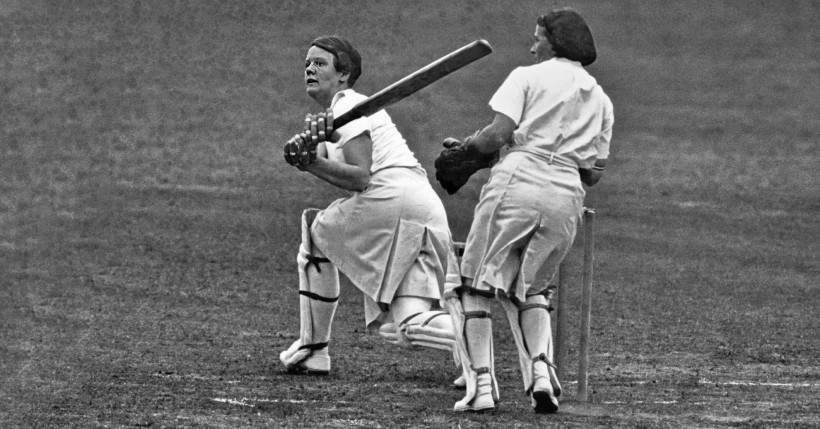Betty Archdale, captain of Kent & England
Friday 8th March 2024

Kent Cricket Heritage Trust’s Jo Rice reveals the story of Kent Women’s fourth Capped Player, and England Women’s first Test Captain, Betty Archdale.
Helen Elizabeth “Betty” Archdale, of Kent and England, captained the first women’s team to tour Australia and New Zealand, in 1934/35. Born in London on 21 August 1907, she came from a campaigning family.
Her mother, also Helen, was a suffragette who was once jailed for smashing windows while demonstrating for votes for women. Visiting her mother in Holloway prison was one of the defining memories of her life, and underlined the radical approach she applied to everything she did. Her godmother was Emmeline Pankhurst.
Her father, a career soldier, was killed in the First World War when Betty was only 11. Young Betty was educated at Bedales School in Hampshire and then at St. Leonard’s School in St. Andrews, at that time a powerhouse of girls’ cricket, after which she studied to become a barrister and played her cricket mainly in and for Kent.

When it came to picking a captain for the England Women’s team to tour Australia in the inaugural Test series between the two countries in 1934/35, the vivacious and sociable Betty Archdale was the obvious candidate.
In those days, there was no funding for women’s cricket, and each player had to find the most part of the cost of the trip themselves, but nevertheless the 15-woman strong England touring party was virtually the best it could have been, although Kent’s Blaker twins, who were expected to be chosen, did not tour. There was great interest in the tour, and many fund-raising events and schemes helped to cover the required costs. As they left St. Pancras station to board the ship that was to take them to Australia, Betty was quoted as saying, “This is our first trip abroad and I am so thrilled I can hardly think.”
Betty was a tall woman, described by Reuters as ‘the young Eton cropped law student’ who led the touring team. She was a strong middle order batter, playing a couple of crucial innings in the three-Test series to help England win a low-scoring series, but more importantly she was a great ambassador for the sport, her ‘forthright and engaging personality’, according to Wisden Australia, helping to heal the wounds of the Bodyline tour two years earlier, wounds which had been partly healed by the Australian men’s tour of 1934. As one reporter noted, ‘it is unlikely that we shall have any leg theory revival during this friendly visit’.
The press reports of the time seemed to express more interest in what the players would be wearing rather than the scores of the matches. ‘It is stated that the official dress for the tourists for play will be white blouses, divided skirts and cotton hats’. The overall look was described as ‘very demure’ with ‘no display of bare legs…. White shoes and stockings will complete their outfit.’
The England team won the series quite comfortably, winning the first of the three three-day Tests at Brisbane by nine wickets, the second Test at Sydney by eight wickets and drawing the third Test at Melbourne with Australia still needing 62 to win with only two wickets in hand. Two other Kent players, Marjorie Richards and Carol Valentine (sister of Bryan), were also on the tour, and played supporting roles in the Tests.
After the successful two-month tour of Australia, the team set off for New Zealand, where they stayed for a further three weeks, playing one very one-sided Test against New Zealand at Lancaster Park, Christchurch. New Zealand batted first, and after being at one stage 16 for 7, they reached 44 all out. The England team then made 503 for 5 declared, including Marjorie Richards’ highest Test score of 48 not out, and NZ were toppled for 122 in their second innings, leaving Betty Archdale’s England victors by an innings and 337 runs.
On her return to England after the triumphant tour, Archdale devoted most of her time to qualifying as a lawyer, which she did in 1937, and her time on the cricket field was severely limited. Most of her matches, over a dozen of which were for H.E. Archdale’s XI, were played at the annual WCA cricket festival based at Colwall in Herefordshire, although she did play a couple of games for Kent Women in the latter part of the 1930s. Despite playing comparatively little cricket, she was appointed captain for the projected England Women’s tour of Australia in the winter of 1939/40, which was overtaken by events.

The war brought a complete change of direction. She joined the WRNS, as a wireless operator, and was posted to Singapore in the summer of 1941, barely six months before the Japanese invaded. She managed to escape, and for her bravery in helping others escape, she was awarded the OBE.
After the War she emigrated to Australia where she swapped law courts for the classroom and devoted herself to the promotion and improvement of girls’ education. She was principal of Sydney University’s Women’s College (where the England team had stayed during the Sydney leg of the 1934/35 tour) for a decade, and a member of the University Senate for 25 years, while still finding time to be a popular and influential public speaker and broadcaster. On 25 January 1949, aged 41, she played her last big game, a one day match as a guest for the touring England Women against Margaret Peden’s Australian side, in Melbourne. She scored just one run, a downbeat finale.
Neither cricket nor the Australian people forgot her, though. In 1997, she was voted one of Australia’s One Hundred Living Treasures, and in 1999 was elected as one of the first female honorary members of MCC. She died on 11 January 2000, aged 92.
The Kent Cricket Heritage Trust is a charitable trust set up to manage the collection of memorabilia, papers and artworks owned by Kent County Cricket Club.
The Trust aims to show the part that cricket has played in the history of the county, not only through the first-class game but also through the hundreds of town, village and wandering clubs that are an essential part of the game in Kent.
Find out more
An unmissable evening of cricket is coming to Canterbury in the Summer of 2024, and tickets are now on sale to see England’s heroes take on the White Ferns of New Zealand in Canterbury, just an hour’s journey from the capital.
Tickets for England Women vs. New Zealand are now on sale – be there to witness England in T20 action:
Buy tickets now
England Women vs. New Zealand at The Spitfire Ground in July is not included in 2024 Memberships or Six Pack ticket bundles. Members, Six Pack & Six Pack Plus holders should purchase tickets from the Club website.

